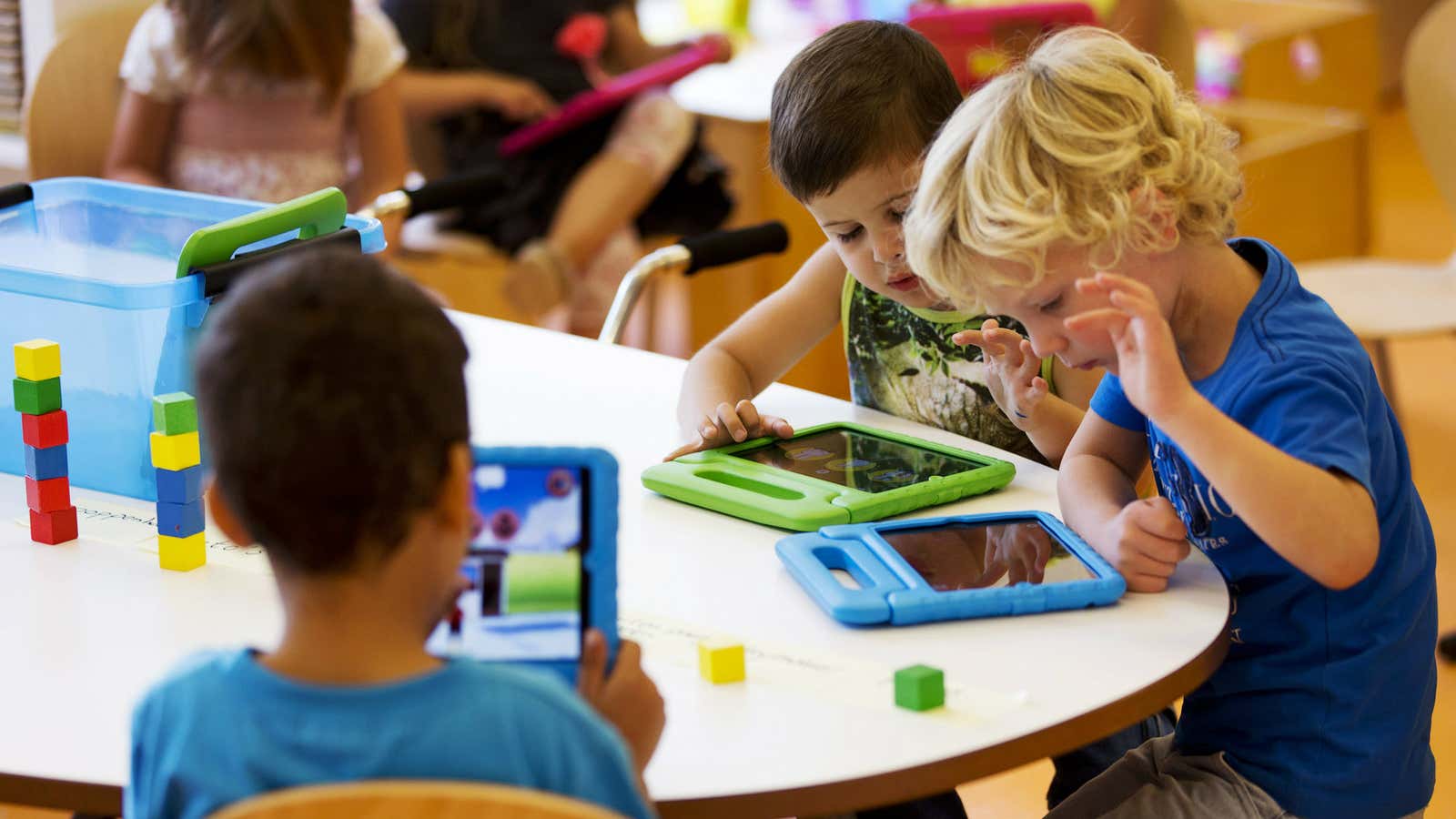The “educational” apps we buy our kids are not very educational, two leading researchers have found.
Authors Lisa Guernsey and Michael Levine spent five years researching the role of media and technology on children’s literacy. The result is Tap Click and Read, a book that explains how to make the abundance of both work to advance real literacy and learning.
The authors ask whether the “educational” apps that parents buy are actually educational. “Most apps fail miserably,” Levine tells Quartz.
Levine, who founded the Joan Ganz Cooney Center at Sesame Workshop, a nonprofit that researches educational technologies for underserved children, said parents should look for three things when considering whether an app is educational:
1) Did experts who know something about literacy or child development help develop it?
2) Is there an intentionally-sequenced curriculum with real learning goals?
3) Has it been tested to do what it says it does?
Their conclusions are stark: the most popular and successful literacy and language apps have virtually no input from literacy experts, limited input from child development experts, and are rarely are tested to see if their educational claims are real. Few have a sequenced curriculum (ideas that build on one another and actually help kids learn).
Guernsey, director of the Learning Technologies Project in the Education Policy Program at New America, a think tank, and Levine put together a team to examine 184 apps that were “award-winning” or the most popular in the educational category of literacy and language apps for 0-8 year olds. The team looked at what the apps taught, measured against 23 skills from literature and curriculum guides such as vocabulary, story-telling/narrative sequence, reading comprehension. It also examined how the apps taught, coding samples from them against 21 strategies used to teach language and literacy (labelling, tracing, highlighting). The bottom line: beyond teaching ABCs, the apps were not very educational.
Levine isn’t in the business of recommending apps, but here are four that didn’t fall woefully short, and one that is fun:
- Learn with Homer: ”It takes you into an immersive literacy experience that blends learning to read and reading to learn. It allows you to make up your own stories and write your own stories and publish your own stories. It’s a much bigger platform than a single app.”
- Toontastic: ”It’s a story narrative app that wonderfully allows children to co- engage with their peers and adults to imagine and create wild tales of adventure and to publish their own creations.”
- Motion Math: ”It’s been carefully tested for educational impact and is advised by serious mathematicians, unlike many other apps in that category. They have a set of related apps now that allow a young child to advance on a wide range of computational skills.”
- Big Birds Words: “It uses augmented reality to help children boost their vocabularies and encourages co-engagement with their parents,” he says. (Levine’s nonprofit is part of the Sesame Workshop).
- Toca Boca: Not as much for the education as the beauty and creativity of it. “These apps are very popular, beautifully designed and full of creative play ideas,” he says. “They market themselves more as digital toys that kids love, and feature great early learning routines like dressing-up, having a Tea Party, doing hair and building.”
Refreshingly, Guernsey and Levine don’t view the media/technology/children cocktail as either a moral menace or an elixir for all that ails us. RAND estimates 2-4 year olds spend 2-5 hours a day with media and technology and more as kids get older. But there’s also a “quiet crisis” in literacy. Two-thirds of fourth graders are not reading at grade level in spite of the billions of dollars spent on improving literacy. So the authors wrote the book in part to examine what role media and technology did—and should—play in literacy. They discovered that parents need to manage the experience intentionally, and not fall into the “tap, click, cringe, and hope-for-the-best” mindset.
The authors offer parents this list of resources to help vet their kids’ apps. Of them, Levine recommends Common Sense Media’s “Best apps and Games” section, whose team of experts are led by an editor with a background in education and child development, and Children’s Tech Review, started in 1993 by by Warren Buckleitner, who started as an elementary school teachers and has a PhD in education psychology.
Anne Marie Slaughter, who founded the New America Institute, introduced the authors at a recent event by telling the audience that if you are a parent, you are a teacher: “You are shaping their brains. You are determining what they can learn for the rest of their lives.”
No pressure, parents.




